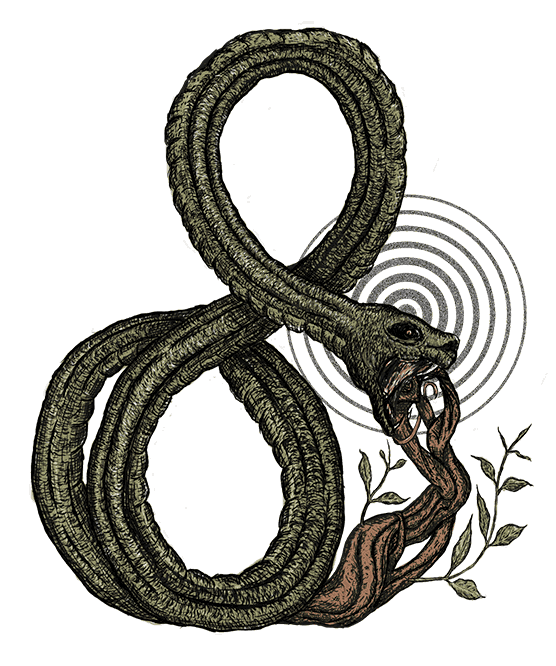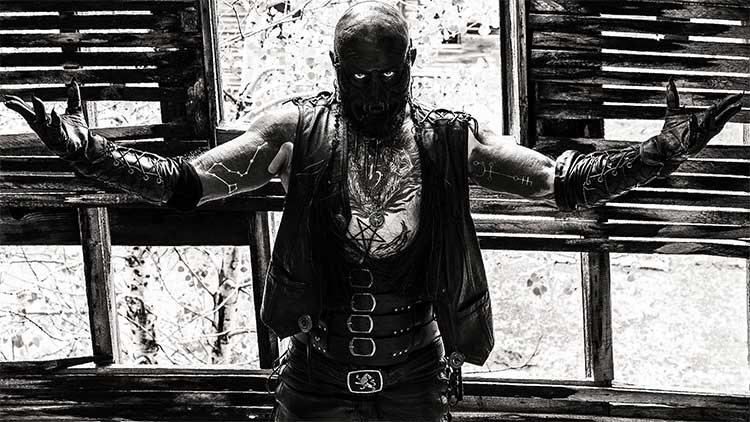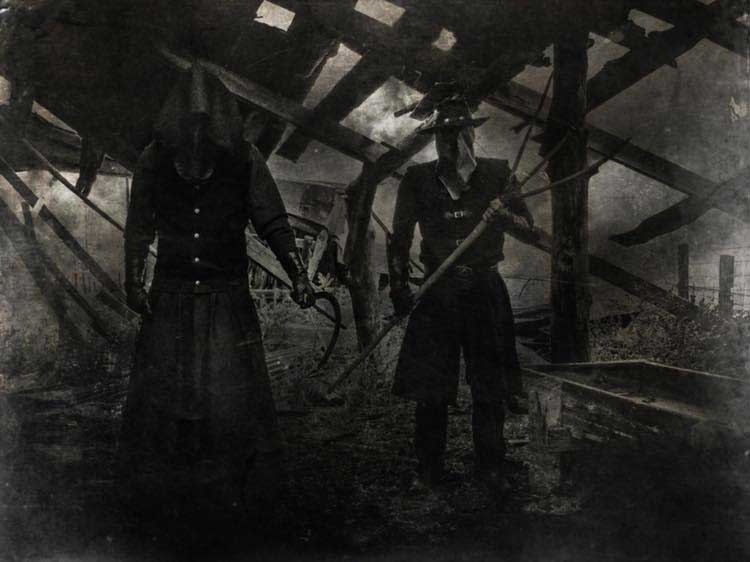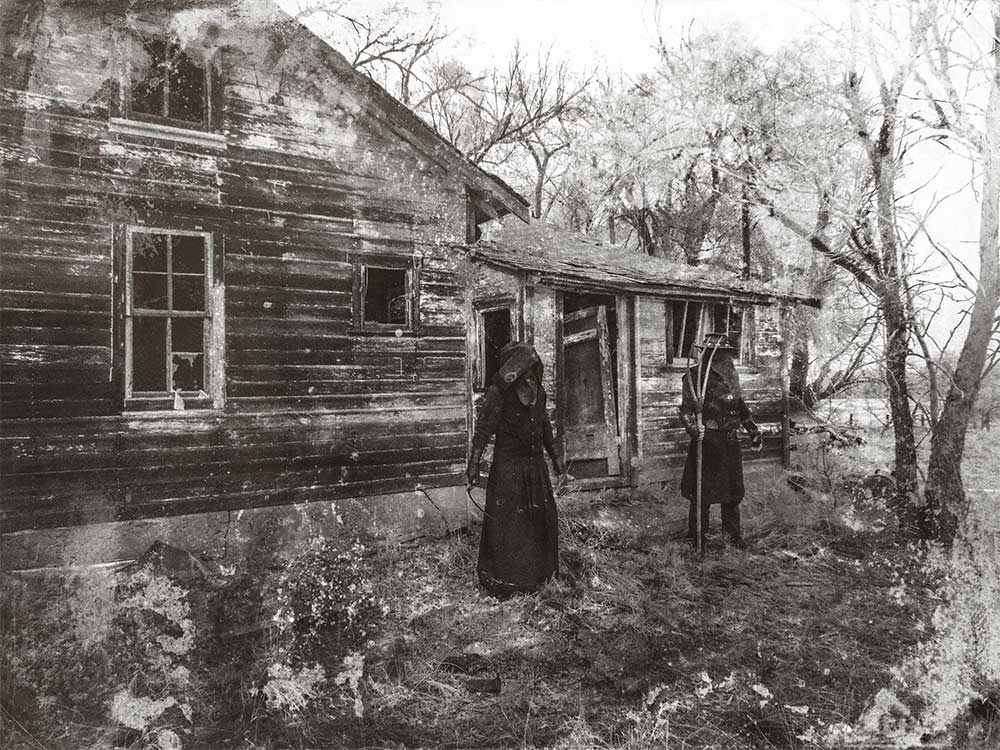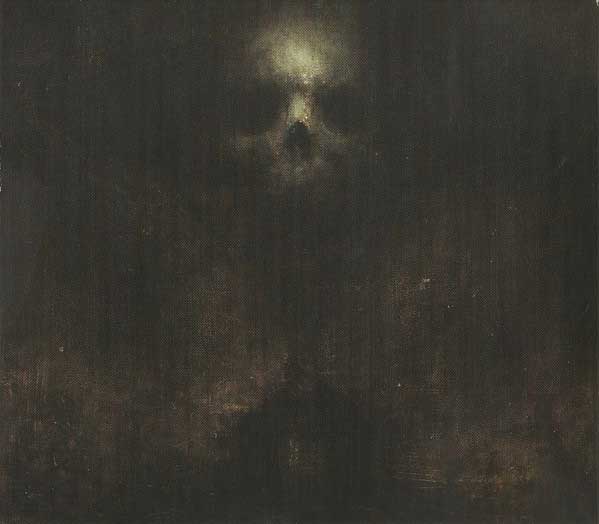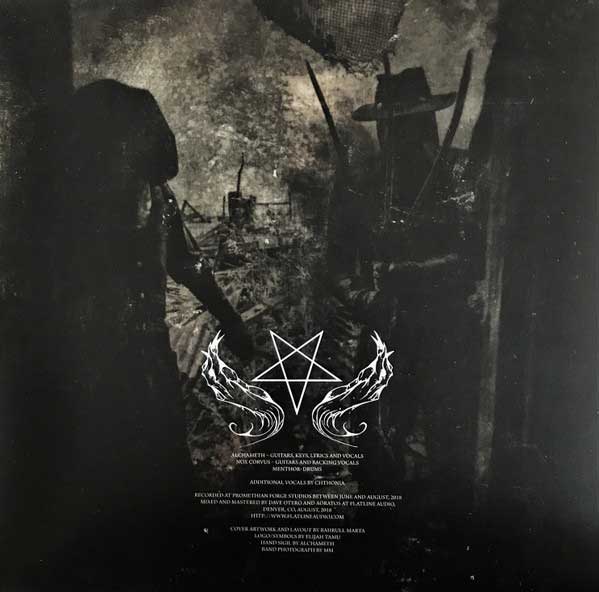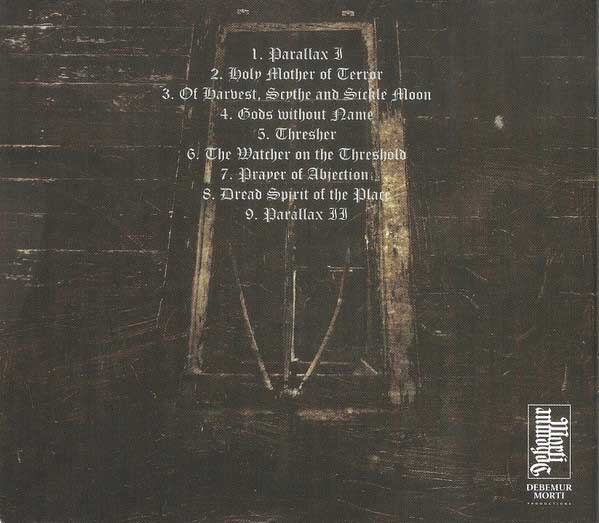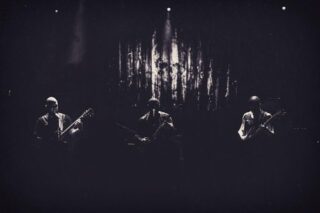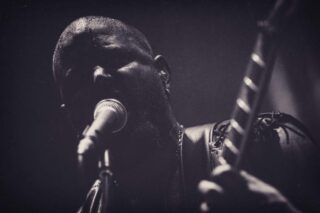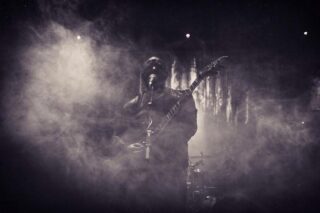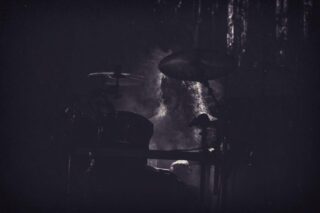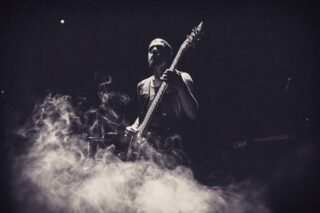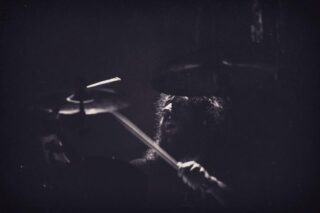Akhlys II
2024-03-28
by Niklas Göransson
Imprisonment and isolation in a world beset by plague – Naas Alcameth of American black metal band Akhlys discusses the events that became the crucible for his seminal album, Melinoë.
NAAS ALCAMETH: Nox Corvus and I have known each other since our early teens, but we didn’t speak for several years after he left NIGHTBRINGER. Eventually, I realised there were things I could’ve handled better and reached out. I wanted to not only mend the rift but also reignite our shared passion for music. Nox had kind of fallen away from black metal in general, which I saw as a waste of his potential.
In 2011, the year before his departure from NIGHTBRINGER, Nox Corvus released “Starlight over Winterscape” – the debut album of his solo project, SERPENT OF THE BLACK FOREST. Since then, he’d remained largely inactive until contacted by Alcameth in 2017. At the time, NIGHTBRINGER had just released their fifth studio album, “Terra Damnata”, through Season of Mist.
ALCAMETH: Rebuilding that relationship took some time and effort. Convincing Nox was no easy task, but I framed it as me presenting him with an opportunity to break free from mundane monotony. You know, ‘We’re moving towards our forties. Are you just gonna go to work, live out your daily life, and then die? I know you love to create; you’ve got to do something, right?’
After some persuasion and clearing the air, Nox Corvus agreed to resume his collaboration – and friendship – with Alcameth.
ALCAMETH: Once we sat down and started tracking at my house, it was just like the old days: immediate and instinctive. He brought such great ideas – and together, we formulated a really compelling concept, giving personal value to our work and proving that we could still create something meaningful together.
While preparing the material, it became clear that the album would be released not as AKHLYS but as yet another new outfit – AORATOS.
ALCAMETH: This one’s totally on me. I had signed to a label that I immediately regretted, thereby finding myself in a situation where legally, I wouldn’t have been able to pursue AKHLYS as I wanted. Me being who I am, I said, ‘Well then – fuck you, I’ll do something else.’ I asked myself, ‘How can I move forward here without being entangled in some kind of legal mire?’ The solution was to call it something else.
In a 2019 Bardo Methodology interview, Alcameth described AORATOS as a twin reflection of AKHLYS. While musically similar, the thematic content differs. Both engage with liminal spaces; but whilst AKHLYS dwells in the realm of dreams, AORATOS looks to the waking world of humanity.
ALCAMETH: I knew I couldn’t just announce a new band also centred around dreams; that would’ve been redundant. I had to find something else deeply personal to focus on and became utterly fascinated by the concept of the genius loci. Instead of co-opting another European theme – which I can certainly appreciate and relate to – this felt like something closer to home.
‘Genius loci’ is a term from the pre-Christian Roman religion and refers to the protective spirit of a place. The traditional perspective regards these entities as autonomous and intelligent, endowed with unique qualities that shape the atmosphere of their surroundings. It’s an outlook that exceeds mere psychological reactions to an environment – proposing instead that locations hold an inherent presence, perceivable as anything from serenity to unease.
ALCAMETH: It occurred to me that while in Europe you might find this essence wandering through ancient castle ruins, America presents a different canvas. We have these vast, untouched spaces that hum with the same profound sense of place – areas untouched by man, desolate under the moon. Such locations, with their frightening ambiences and abandoned structures, seem to attract a spirit of their own. So, I started obsessing over this concept, which somehow ties into the American Gothic idea.
American Gothic typically refers to an artistic style that is distinctly American and often encompasses a horror-tinged view of life – especially as it pertains to rural regions and small towns.
ALCAMETH: I have all these childhood memories of forgotten areas that were never urbanised, with vast wheat fields and dilapidated farms – I grew up around all that. There’s something about such places that seems to resonate with a soul of its own. Nox was obviously on board, being also from Colorado. We thought it would provide a great aesthetic for our work, one that felt genuine and close to home.
Colorado is known not only for its mountain ranges but also for its many deserted areas – remnants of the mining era and agricultural downturns over the years. One such location was chosen as the backdrop for AORATOS’ visual representation.
ALCAMETH: The day we went out to this abandoned farm for our photoshoot was one of the coldest I can remember of the entire year – miserable weather, miserable circumstances – but that just added to the atmosphere. We also had to trespass because it was private land, which gave the whole undertaking an element of the forbidden.
These shots really did turn out killer. In the 2019 interview, I described them as somewhere in between American Gothic and the old HBO series Carnivàle.
ALCAMETH: Those photos are some of my personal favourites because they perfectly capture the essence I was after. This kind of thinking also spilt over into the songs, like the album title, “Gods Without Names” – which is inspired by the Greek practice that when someone entered a foreign area, they’d offer thanks and praise as a protective measure, acknowledging the presence of unknown gods and daemons. Like Deus absconditus in a way.
‘Deus absconditus’, Latin for ‘hidden god’, is a philosophical concept from Christian theology. The notion suggests an ambiguousness and inaccessibility of the divine nature – that God’s true essence and plans are beyond human understanding.
ALCAMETH: At the time, I was reading a very important book called The God of Socrates, where the author, Apuleius, breaks down how the Greeks had this interchangeable term for ‘gods’ that could mean a God proper, a spirit, or a daemon. That’s the approach we took here: venturing into lands unknown and sensing a presence that isn’t necessarily familiar or articulable. These are the ‘gods without names’ – the unruly spirits of the place. Similarly, the band name is connected to this.
‘Aoratos’ is a Greek word meaning ‘invisible’ or ‘unseen’. In philosophical or metaphysical discussions, the term typically refers to intangible concepts, spiritual presences, or forces that elude human perception.
ALCAMETH: We were trying to set the stage for this turn-of-the-century kind of horrific, liminal experience. One day, I had an idea for the perfect sound to encapsulate that. There’s an excellent online resource called the Free Sound Project; it has thousands of audio samples accessible via keyword search. I discovered a recording of an old gramophone starting up, complete with the static – it captured precisely the feel I was after. I thought, ‘That’s it. This is how the album starts; this is how it ends.’
“Gods Without Names” was released by Debemur Morti Productions in March 2019. Meanwhile, as AKHLYS and – to a lesser extent – AORATOS were taking off, NIGHTBRINGER ground to a halt in the wake of “Terra Damnata”. With members split between Europe and the States, the preceding years had seen very little live activity.
ALCAMETH: It got to the point where we’d play sporadic shows once a year. We’d manage to practise once or twice beforehand, and that’s just not enough. NIGHTBRINGER is by far the most challenging material I’ve ever performed live. So, we started to realise that maybe this wasn’t the best idea. That’s what led me back to the basic band concept: local members only, jamming weekly.
Alongside Nox Corvus and drummer Eoghan, Alcameth recruited some local musicians for the first iteration of AKHLYS’ concert line-up.
ALCAMETH: I told the guys, ‘If AKHLYS is gonna be a live act, we need to establish our identity. Are we primarily a studio band, or are we both? Because this demands a significant commitment.’ It’s like any discipline really, whether it’s martial arts or whatever you’re into; there must be continuous engagement. If not, you risk embarrassing yourself by getting your ass kicked or – in our case – playing a subpar show. We’ve experienced that, and it’s quite humbling.
In the early summer of 2019, the stage debut of both AORATOS and AKHLYS took place at Iceland’s Ascension Festival.
ALCAMETH: Not only was it my first time on stage in two years – more importantly, I hadn’t played guitar live since 2002. Truthfully, it was very anxiety-inducing since I also did the vocals. When we got up there to line-check, the entire festival area was packed from front to back. That felt amazing. Until then, I hadn’t realised how popular AKHLYS had become. Unfortunately, I don’t think we were fully prepared.
There is certainly such an argument to be made. Things were not off to a stellar start, as evidenced by the half-hour line check.
ALCAMETH: We had some technical difficulties that ate up a lot of our set. Obviously, festivals have a very limited timeframe for when bands play. We were running around panicking, basically. And once we finally got started, it turned into one of the most disheartening experiences in the world. Halfway through our set, I looked out and saw that about fifty per cent of the audience had left <laughs>. That tells you everything about how things are going.
What went wrong?
ALCAMETH: To be honest, I didn’t have the right people. We weren’t practised enough. We threw ourselves immediately onto a big stage, got up there and played a half-assed set. And I must be able to cop to that and admit it. But yeah, this was the very first AKHLYS show, and it ended up creating all kinds of anxiety for me afterwards.
Unsurprisingly, AKHLYS were roasted in the comment sections of subsequently uploaded live footage. One rather candid observation stated, ‘Sounded like they hadn’t rehearsed once. Extremely disappointing. Should have stayed a studio band.’
ALCAMETH: That’s what made me vow, ‘Never again.’ Now, this stance leaves you with two choices: you can either lament and go, ‘Fuck it, we’re done playing live.’ Or you can say, ‘To hell with that – I know we can do this. Obviously, more time and refinements need to be put into it. We need to all be fully on board.’ The Iceland debacle remained a lingering moment of great disappointment in my mind; I was so die-hard on correcting it. But then I went to jail, and then we went into COVID.
Alcameth’s late 2019 incarceration is discussed extensively in the print-exclusive AKHLYS feature in Bardo Methodology #8.
ALCAMETH: The day you turn yourself in, you can request a leave of absence to prepare for jail. Well, unless you’re facing some crazy charge like murder or rape, in which case you’re headed straight to prison. I figured, ‘Why add two weeks of extra stress?’ So, I only asked for a couple of days. When I went in, I was processed by this kid who looked barely out of his teens. He seemed very young and was clearly trying to act tough. He took me down into a room where I had to strip naked.
The strip-search routine entails getting undressed, squatting, and then producing a cough to demonstrate that there is no contraband lurking in the nether cavities.
ALCAMETH: You gotta get used to that real quick because it becomes an everyday thing. Anyway, this kid was processing me, snapping some photographs, and taking notes. As you can see, I’m heavily tattooed – and tattoos are how they determine and track gang activity. He started asking, ‘Which rune is that? What does that symbol mean?’ And I was like, ‘That’s not a fucking rune! I know where you’re going with this; you’re trying to tag me as a white supremacist.’
In the US penitentiary system, gangs often form along ethnic or racial lines. Consequently, prison officials pay close attention to tattoos and other markers that might indicate group affiliation, as these can influence the dynamics of power and stir conflict within the institution.
ALCAMETH: Then, all of a sudden, the kid goes, ‘Are you into black metal?’ <laughs> ‘Yeah.’ He’s like, ‘I could tell by your ink, man. My friends and I are trying to get something going.’ Then he called me up to the computer, ‘Hey, what’s the name of your band?’ So, I told him, and he looked us up on Metal Archives. ‘Oh wow, that’s cool.’ So, it turned out he wasn’t trying to peg me as a gang member; he was just curious about my tattoos after figuring I’d be into black metal.
How were the guards in general?
ALCAMETH: We had a few younger guys hoping to get into law enforcement – they were cool and would help you get extra toilet paper or whatever. Others were distinctly unpleasant individuals. One of them… we nicknamed him Dracula because he was very old, with a slicked-back haircut that had obviously been dyed black. He wasn’t the friendliest guard and would carry out what’s known as a shakedown.
Shakedowns are when the inmate is called out of his cell, which is then searched for prohibited items.
ALCAMETH: Sometimes, you’d get good guards who went through your stuff respectfully whereas this Dracula guy would fucking destroy your room. Unfortunately, I dealt with him on a number of occasions. One time, I came back into my cell to find it in complete disarray. The rubber mattress had been overturned, and my books were thrown on the floor. Afterwards, he complained that my cell was a mess and told me to clean it up.
What about your fellow inmates?
ALCAMETH: In America, jails are broken down into pods divided into different segments. The one I was in… I wasn’t all that concerned with most individuals there; we didn’t have much contact. There was always the option to go out to the common room and sit on a steel chair watching football, which I don’t care about, or socialise with these other random people, whom I also didn’t care about.
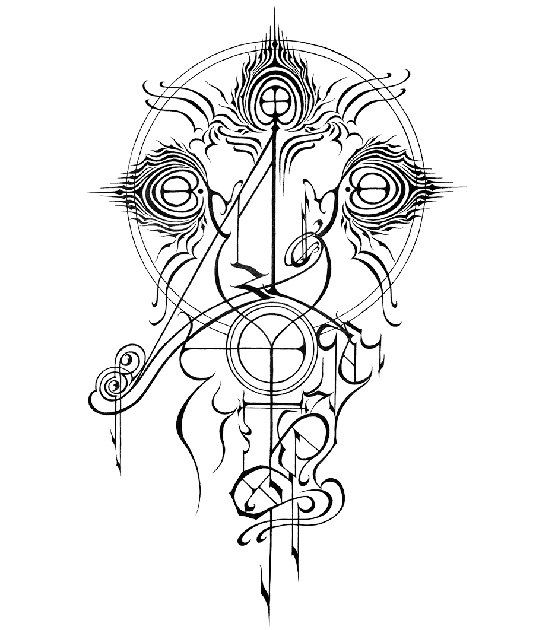
How were the recreational facilities?
ALCAMETH: I didn’t go out in the yard much because it was cold as fuck for the duration of my stay. And once they let you out, it’s for a set amount of time until a sheriff lets you back in. So, you could be freezing your ass off for thirty minutes. But overall, truthfully, the whole jail experience really wasn’t that bad; I came to regard it as a monastic tenure. Most of my time there was spent reading.
Inmates are allowed up to three books, which must be vetted first. Anything containing violence or sexuality is strictly prohibited. Alcameth primarily brought in esoteric literature.
ALCAMETH: Not only did I go down this rabbit hole of later Neoplatonic thinkers, but I also read a lot of excellent fiction. Are you aware of Thomas Ligotti? Look him up. He’s a modern horror author who writes some of the sickest, most demented shit ever. He adheres to an utterly nihilistic philosophical stance, believing life to be a mistake – that everything is depression, and you’re better off committing suicide.
Thomas Ligotti is an American author known for his contributions to supernatural fiction. Born in 1953, Ligotti’s work is highly regarded for its philosophical depth, dense prose, and existential themes. One such premise is that humanity might not be the central or most significant entity in the universe. Ligotti’s narratives frequently suggest that there are far more terrifying and incomprehensible realities underlying our existence.
ALCAMETH: Very strange individual, but he produces this amazing, Lynch-like horror. He’s not just a master of literature but also has a unique, uncanny, and compelling writing style; I ended up reading all his novels during my time in jail. Ligotti’s stories are like experiencing someone’s nightmare.
When I spoke with Alcameth following his release from jail, he mentioned that a positive interaction arose after a fellow inmate noticed him reading a book about night terrors. I found it rather amusing that not even jail can prevent Alcameth from instigating sleep paralysis discourse.
ALCAMETH: Yeah, it was quite bizarre. David and I actually grew quite close. He would’ve been in his seventies and maybe five feet tall. A total alcoholic, but very well-educated – particularly in matters of religion. Once he and I got to talking, we discussed a wide array of subjects. Say, for instance, the Yazidis. I mentioned, ‘Do you know there’s a Gnostic sect still existing today that believes in the concept of Melek Taus?’
The Yazidis are an ethnic group with roots in ancient Gnosticism; they regard Melek Taus – the Peacock Angel – as a guide towards wisdom and knowledge.
ALCAMETH: David was blown away, like, ‘How the fuck do you know about this?’ We’d often trade books – which is technically against the rules, but we did so anyway. The one he saw me reading was David Hufford’s The Terror That Comes in the Night. Hufford, a folklorist, conducted the most thorough investigation into night terrors, focusing not on the sleep process but the eerie visitations people report. It’s a truly seminal study that was significant to me in my twenties.
The Terror That Comes in the Night: An Experience-Centered Study of Supernatural Assault Traditions is a book by David J Hufford, first published in 1982. It approaches sleep paralysis from a folkloric perspective, examining commonalities in personal accounts – notably, the sensation of an oppressive, evil presence – and how they are reported across various cultures and historical periods.
Despite the different framings of these legends, Hufford demonstrates a strong similarity in their core characteristics. They often involve an acute sense of dread, difficulty breathing, and an inability to move – all of which are now understood in medical terms as symptoms of sleep paralysis.
ALCAMETH: Actually, a funny story came out of this. Some inmates arrived at our pod straight from prison; after serving time for more severe crimes, they now had lesser charges to finish up. And one of them… we called him The Podfather because he’d been there for a ridiculous amount of time. He was kind of an unhinged individual who, after some violent act, found Christ while in prison and became deeply religious. And he had this ridiculous tattoo of a tombstone that said, ‘RIP Jesus’ <laughs>.
The hilarity lies in how this tattoo challenges a cornerstone of Christianity: the resurrection of Christ, which asserts Jesus as the Messiah. Suggesting that Jesus merely died and thus ‘rests in peace’ overlooks the doctrine of His resurrection and enduring spiritual presence.
ALCAMETH: So, clearly a low-intellectual motherfucker. His IQ would’ve been around sixty – but he was a very large and obviously dangerous individual. You could tell just by looking into his eyes. One day, David and I had a discussion about various aspects of Catholicism. This guy overheard us and, of course, assumed we were Catholics. But David is completely agnostic – and then there’s me. Obviously, I’m not sharing my ideas with these people.
One day, The Podfather appeared at Alcameth’s doorstep. About two metres (6 ft) in front of each cell, there is a yellow line which inmates are forbidden to cross unless they’re entering their own.
ALCAMETH: I heard him knocking on my door. ‘What the fuck? This idiot is gonna land me in trouble.’ And he wasn’t going away. So, I came out and asked, ‘Can I help you?’ He said, ‘We need to talk.’ I followed him to the common room and sat down. David was there, looking at me apologetically. ‘Ahem, I suggested he consult with you.’ I’m like, ‘Thanks, David’, and turned to The Podfather. ‘About what?’ He goes, ‘Well, you’re a fellow Christian, and I’m having a spiritual dilemma.’
It is worthy of note here that Alcameth had only a few days left before he would be released.
ALCAMETH: ‘Okay, what’s going on?’ And he said, ‘I think I might be possessed by a demon.’ <laughs> Immediately, I thought, ‘Fuck me. I want out of this conversation – now.’ But I played along; ‘What makes you think it’s a demon?’ He straight up told me, ‘I just know. The voices I’m hearing are telling me to do stuff. Bad things.’ And I’m just… ‘Ugh, fuck my life.’ There was no easy way out of this one. I couldn’t exactly challenge him on that assertion, so I suggested, ‘Maybe you should talk to the priest?’
If an inmate belongs to a major religion, they are allowed certain privileges. Catholics, for instance, get an hour off every Sunday to attend mass.
ALCAMETH: He goes, ‘I can’t do that; the priest is one of them. He’s also possessed by a demon.’ My initial thought was that I could ring a bell at any moment and go talk to a sheriff, like, ‘Hey, this fucking guy is losing his shit. You might wanna step in before someone gets hurt.’ They have psychologists on hand and everything. But I also considered, ‘Most of these guards don’t care about you. If the wrong guy is on duty, he could end up telling this fucker – and then I’ve got a problem.’ Luckily, I just let it ride. I didn’t do or say anything. I wished him the best.
log in to keep reading
The second half of this article is reserved for subscribers of the Bardo Methodology online archive. To keep reading, sign up or log in below.
